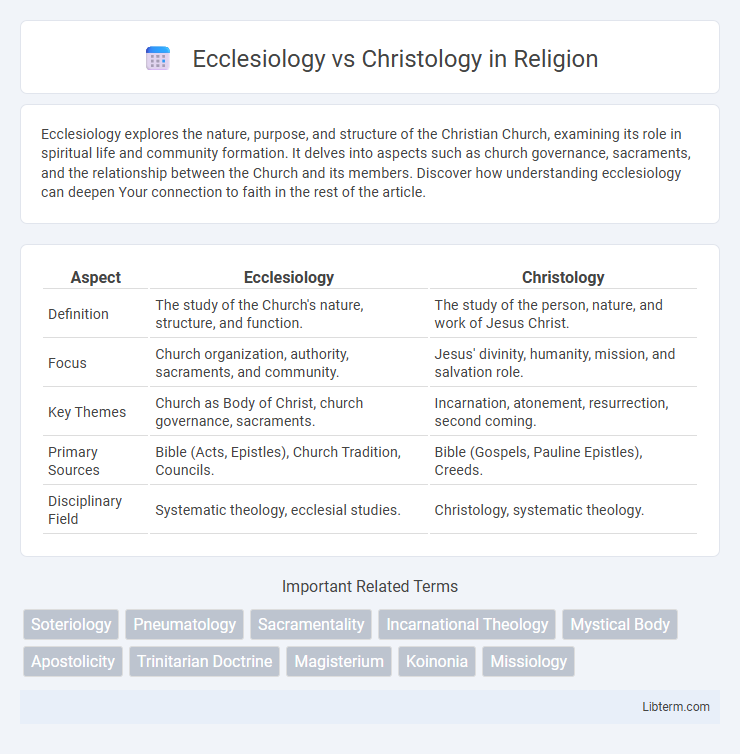Ecclesiology explores the nature, purpose, and structure of the Christian Church, examining its role in spiritual life and community formation. It delves into aspects such as church governance, sacraments, and the relationship between the Church and its members. Discover how understanding ecclesiology can deepen Your connection to faith in the rest of the article.
Table of Comparison
| Aspect | Ecclesiology | Christology |
|---|---|---|
| Definition | The study of the Church's nature, structure, and function. | The study of the person, nature, and work of Jesus Christ. |
| Focus | Church organization, authority, sacraments, and community. | Jesus' divinity, humanity, mission, and salvation role. |
| Key Themes | Church as Body of Christ, church governance, sacraments. | Incarnation, atonement, resurrection, second coming. |
| Primary Sources | Bible (Acts, Epistles), Church Tradition, Councils. | Bible (Gospels, Pauline Epistles), Creeds. |
| Disciplinary Field | Systematic theology, ecclesial studies. | Christology, systematic theology. |
Defining Ecclesiology: The Study of the Church
Ecclesiology is the theological study of the Christian Church, exploring its origin, structure, function, and purpose within God's plan. It examines key concepts such as the nature of the Church as the Body of Christ, its sacraments, governance, and mission. Unlike Christology, which centers on the person and work of Jesus Christ, Ecclesiology focuses on understanding the collective community called to embody Christ's teachings in the world.
Understanding Christology: The Study of Christ
Christology, the theological study of the person and work of Jesus Christ, explores his divine and human natures, focusing on the incarnation, atonement, and resurrection. It addresses the identity of Christ as both fully God and fully man, emphasizing his role in salvation history and the Trinity. Understanding Christology provides essential insights into Christian doctrine, shaping beliefs about Jesus' nature, mission, and redemptive purpose.
Historical Development of Ecclesiology and Christology
The historical development of ecclesiology and christology reveals distinct yet interconnected theological evolutions within early Christianity, with christology primarily addressing the nature and person of Jesus Christ, elaborated through formative councils such as Nicaea (325 AD) and Chalcedon (451 AD). Ecclesiology evolved alongside, focusing on the nature, structure, and function of the Christian Church, shaped significantly by writings from Church Fathers like Augustine and later by the ecumenical councils which defined the Church's authority and sacramental life. This dual development underscores the interdependence of understanding Christ's identity and the Church's role, influencing doctrinal formulations and ecclesiastical governance throughout Christian history.
Key Theological Questions in Ecclesiology
Ecclesiology addresses key theological questions such as the nature and definition of the Church, its purpose and mission, and the role of sacraments and authority within the community of believers. It explores how the Church functions as the Body of Christ, its relationship to salvation, and the significance of church governance and unity. In contrast, Christology focuses on understanding the person, nature, and work of Jesus Christ as central to Christian faith and salvation.
Central Doctrines in Christology
Central doctrines in Christology emphasize the nature and person of Jesus Christ, particularly his divinity, humanity, incarnation, and atonement. Ecclesiology, in contrast, explores the doctrine of the Church, including its origin, purpose, and structure as the Body of Christ. Understanding Christology is essential for comprehending ecclesiological concepts since the Church's identity and mission are rooted in the person and work of Christ.
Ecclesiology vs Christology: Core Differences
Ecclesiology examines the nature, structure, and function of the Church as the community of believers, emphasizing its role in faith, worship, and governance. Christology focuses on the person and work of Jesus Christ, exploring his divinity, humanity, and redemptive mission. The core difference lies in Ecclesiology's concern with the Church as an institution and spiritual body, whereas Christology analyzes the identity and significance of Christ himself.
Intersections Between Ecclesiology and Christology
Ecclesiology and Christology intersect primarily in the understanding of the Church as the Body of Christ, emphasizing the Church's identity rooted in Christ's person and work. The theological study of Christ's nature and mission directly informs the Church's role, authority, and sacramental life, highlighting the unity between Christ's headship and the Church's communal existence. This connection underscores the importance of Christological doctrines in shaping ecclesial practices, governance, and the Church's mission in the world.
Major Debates and Controversies
Major debates in Ecclesiology center on the nature, authority, and structure of the Church, especially the role of the papacy, apostolic succession, and the visible versus invisible Church. Christology controversies focus on the person and work of Jesus Christ, including the debates on His divinity and humanity, highlighted by the Council of Chalcedon's definition of the hypostatic union versus earlier heresies like Arianism and Nestorianism. Both theological fields intersect in discussions on the Church's identity as the Body of Christ, raising questions on ecclesial authority and salvation.
Implications for Contemporary Christian Practice
Ecclesiology shapes contemporary Christian practice by emphasizing the church's communal nature, sacramental life, and mission, fostering active participation and unity among believers. Christology impacts worship and ethical behavior by centering faith on the person and work of Jesus Christ, guiding believers in understanding salvation and moral example. Together, these theological disciplines influence how Christians interpret scripture, engage in community, and live out their faith in modern contexts.
Future Directions in Ecclesiology and Christology Studies
Future directions in Ecclesiology emphasize the integration of digital communication tools to foster global church connectivity and enhance participatory worship experiences. In Christology, emerging studies concentrate on contextualizing Christ's identity within intercultural dialogues, addressing contemporary ethical challenges and social justice issues. Both fields increasingly collaborate to explore the dynamic relationship between the evolving church community and the understanding of Christ's role in diverse cultural and technological landscapes.
Ecclesiology Infographic

 libterm.com
libterm.com